Our darkest days are always followed by our finest hours. One can only hope that in this current political climate, those words— belonging to playwright Aaron Sorkin— carry the burden of truth we so desperately need them to. Audiences across the nation would be fooling themselves if they didn’t think that Harper Lee’s To Kill A Mockingbird, as adapted to the stage by playwright Aaron Sorkin, isn’t as— if not even more— relevant now than when it was written. Directed by Bartlett Sher, this breathtaking drama is striking in its beauty, harrowing in its ugly truths, and poised perfectly for nearly three hours’ stage-traffic that is executed so flawlessly, you don’t even notice that three hours has passed when all is said and done. The most enthralling stage dramatization of a literary classic in recollective history, To Kill A Mockingbird is a disarming, fascinating theatrical production that is wholly moving.
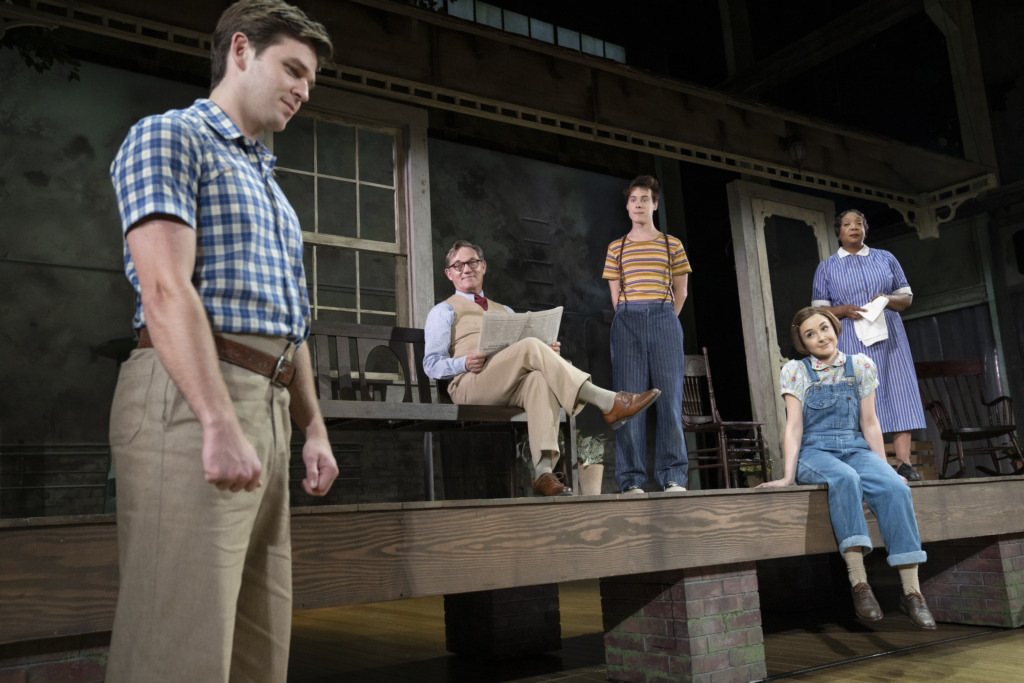
If there’s a singular fault to be had in this current national touring production of To Kill A Mockingbird it’s the overly emphasized moment wherein Bartlett Sher directs Richard Thomas (as Atticus Finch) to turn out directly to the audience and make his “…we have to heal this wound now or we will never stop bleeding…” speech. Given that the Atticus Finch character is not one of the three youngins who are both a part of the narrative whilst also narrating the story, it feels forced having the Atticus Finch character make that direct address with theatergoers. The intention is clear— we’re in a sorry state as a nation and there’s still a chance to get our act together but not if we remain inactive— but it’s just too hard of a smack over the head with a political agenda. And as most of the people who so desperately need to hear that message are either not in attendance or lack the basic intellectual skillset to process, accept, and practice the principle that all people are created equal and have basic human rights, the moment it becomes a direct address to the audience, it ruins an otherwise flawless work of theatre. This minor tear in the fabric of the constructed reality of the play can be glossed over, given how potent, powerful, and utterly perfect this dramatization truly is.
There is a set, which drifts in and out of the scenes almost the way memories do in and out of the mind. Scenic Designer Miriam Buether’s set, in conjunction with Jennifer Tipton’s lighting design, fits seamlessly into Bartlett Sher’s concept of Aaron Sorkin’s work. The play exists in memory— a recollection of ‘how things happened that summer’ told primarily from the vantage point of Scout Finch, and to a lesser degree her brother Jem and their friend Dill. And the set— almost skeletal and ephemeral in its construct— becomes a wisp of that memory, gently swooshing on and off the stage. The porch is the most impressive piece of all the set pieces, again almost skeletal in nature— barren framework that starts the outlined allusion of a set, allowing one’s own memory to fill in the blanks. It’s striking in this enigmatically beautiful way. Combined with the subtle lighting from Tipton’s design work, the show slips in and out of dawns, dusks, daylights, interiors and exteriors all as if things are happening in real time and simultaneously in recalled time. It’s a fascinating phenomenon to achieve.
The fluidity of the show’s narrative— everything from the way the characters grace their way on and off the stage— even when they’re arriving in bursts of staccato shouting or frenetic running— is one gentle, sluice of memory. Director Bartlett Sher has found a rhythm for the show’s overall pacing that not only captivates the audience but hypnotizes them. They’re spellbound watching all of these moments unfold. Sher also finds a way to capitalize on what humor there is to be had in the play; there are dark and heavy subject matters that dominate the show and yet lighthearted moments burst through frequently, resulting in a great deal of chuckling and full-out laughter from the audience; the balance is striking. And the whole experience is accompanied by stirring original music created by Adam Guettel.
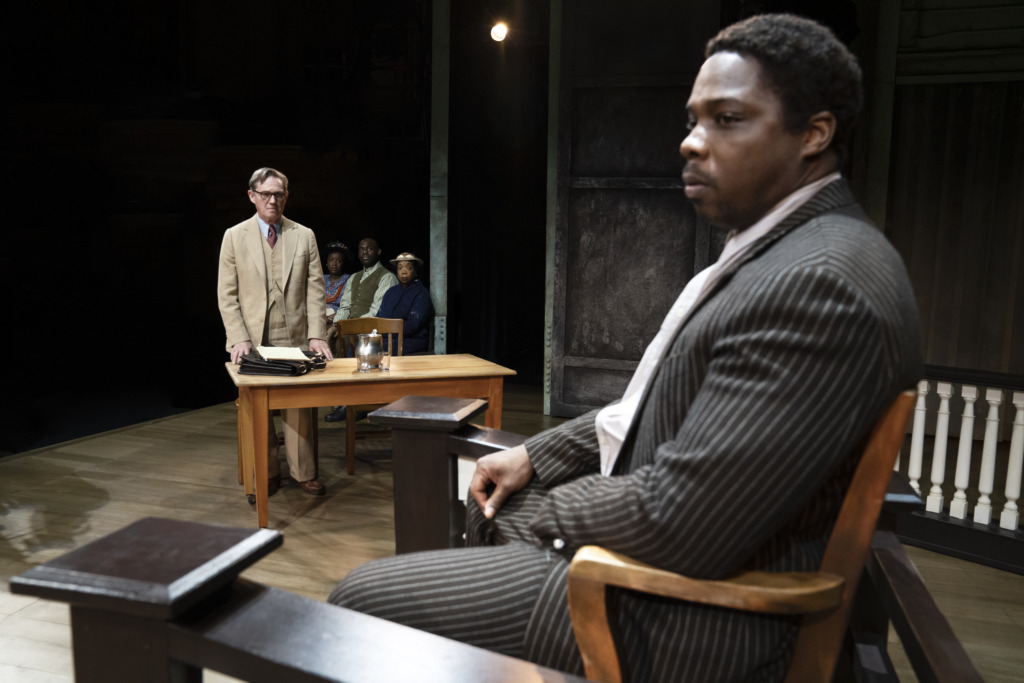
For a character who is referenced more than he’s physically seen, the actor playing Boo Radley does make quite the impression upon finally being seen. Travis Johns, looks every bit ‘not-so-scary-up-close’ once he’s ensconced into the final moments of the play. Johns doubles up as Mr. Cunningham, one of the farm-folk in Maycomb, Alabama who engages in one of the more powerful moments of diffusion in the production. Johns, arriving with a sack over his head outside the county jailhouse, eventually reveals himself in this really heart-tugging moment shared between the character and young Scout (not for anything in particular that the character does, mind you— the character of Mr. Cunningham seems fairly unredeemable right up until Scout forces a humanity onto him.) But that moment really carries emotional weight to it and you find yourself holding your breath as Scout addresses him, just being simple, friendly, and childlike.
The other two deplorables (though that goes down an entire rabbit hole, as the play later exposes…. particularly once Calpurnia puts it out there “…respect everyone no matter who you disrespect to do it…”) that get highlighted in this production are Bob Ewell (Joey Collins) and his daughter Mayella Ewell (Mariah Lee.) The histrionics that Lee’s character erupts with on the stand in the courtroom scene are brutal, especially as the Atticus Finch character puts the fear of God into her with his accurate accusations. Lee’s accent falls odd on the ear, but is probably exactly how an uneducated, impoverished white girl in the south is supposed to sound circa 1934. Joey Collins as Bob Ewell makes you truly believe in the opening lines— ‘Bob Ewell fell on his knife.’ The revolting pride that Collins portrays as the proud racist character of Bob Ewell is enough to turn your stomach, raise your blood pressure, and make you cry. This pair of performers are selling these irredeemable characters hard, making them truly unpalatable.
One of the lesser characters featured in the original novel’s narrative (or perhaps just so obscurely that nobody remembers him from when we all read it back in high school…) is Link Deas (Jeff Still), the town drunk. Still gives a sensational performance for his few cameo moments. Cheeky but in a deadpan-sarcastic way, Still delivers the character as someone who— not unlike Boo Radley— just wants to be left alone. He’s accused of being the town drunk, the kids learn later that it’s soda pop with two straws inside his brown paper bag with the reasoning of ‘I just want to be left alone.’ And yes the character may be retooled in this fashion to serve Sorkin’s rendering of the narrative, but Still delivers it perfectly. And when he shares his own personal, relatable tragedy to the way racism has ruined the world, its striking.
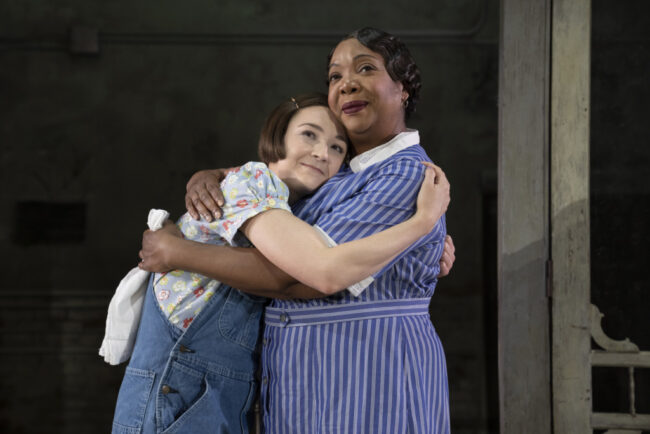
Tasked with a great deal of the show’s laugh-points as well as a great many more of the show’s heavy, hit-home, weighted moments, Calpurnia (Jacqueline Williams) fits into this narrative in memory like a charm. Williams has a superb handle on her delivery, knowing exactly how to deliver certain lines for maximum comedic effect, as well as maximum emotional gravitas. Though her predominant interactions are with Atticus Finch, Williams has a few strong and beautiful moments played opposite of Scout as well. The moment of reckoning and truth, when she points out the harshly flawed truth behind Atticus’ approach of ‘respect everybody’ leaves the audience in a stunned, reflective silence.
Taking up the mantle of the show’s most difficult-to-portray character, Yaegel T. Welch delivers a harrowing portrayal of Tom Robinson. Everything from the flow of his speech cadence, patois, and overall delivery, to the way he presents himself on the stand. Welch is earnest, open, and invites those in the courtroom on-stage, as well as those observing out in the audience, into his character’s experience and it is not for the weak of heart. Watching Yaegel force the character apart, breaking under the relentless badgering of the prosecuting attorney, is truly gut-wrenching. The moment when he cries out exactly why he stopped to help Mayella Ewell, knowing full-well what will happen when he does, has the collective pulse of the audience unhinged with nauseating knots in the stomachs because of the brutal injustice that accompanies such a stellar performance.
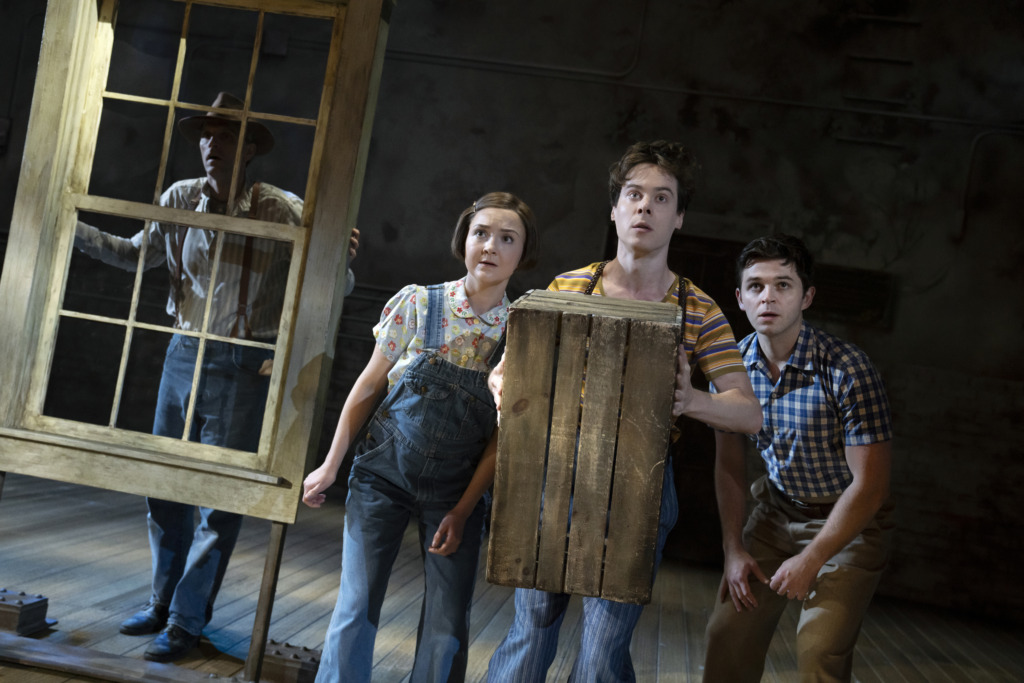
Appearing as a self-proclaimed narrating figure who will also engage in being part of the narrative, Dill Harris (Steven Lee Johnson) is precious, hilarious, and the perfect balance between an inquisitive Scout, a furiously proud Jem, and he creates the perfect point of wondrous confusion for Atticus Finch. While all three of the ‘children’ are played by grown-adult actors, and all three of the ‘children’ do exceptional jobs of channeling that youthful experience of being a child of a certain age in that time period, Johnson’s Dill is the most juvenile. There is something about his simple ignorance that is just delightful to watch. (This makes the ominous announcement of his character’s uncertain future that much harder to swallow.) Johnson is bursting to the brim with this effervescence that he seems to have no earthly right to possess, given his family situation, and yet he’s just afloat with simplistic joy, curiosity, and wonder. And he never ceases to put a look of genuine surprise on Atticus Finch’s face whenever he says something truly smart and clever.
Jem Finch (Justin Mark) is the epitome of a teenage boy who believes himself to be a man, struggling to navigate his place in the world. Mark masters the delivery of what would be described in modernity as ‘teenaged angst’ but in the Jem Finch days comes across more as unchecked and frustration at not knowing or truly having a place where he feels he’s doing enough. His comic timing is sharp, his tone always laced with that backbiting hint of defiance, even when he’s forcing himself to be respectful, and his overall interactions with both Scout and Dill are engaging and wholly believable. Mark carries his portions of the narrative with just a hint of seasoning, as he is meant to be the older brother character. He’s a right sparked-up fiery canon when it comes to encountering that racist Bob Ewell and when he’s describing the incident with crotchety old Mrs. Dubose flowers. Though his story about the pants is quite hilarious.
Maeve Moynihan is the epitome of Scout Finch. There is an unfettered energy about her portrayal that even when she’s standing still feels lively. There are often moments where Moynihan’s Scout is lurking or hovering in the background, standing very, very still and you can almost feel the dynamic split between her two selves— in-scene, child-Scout who is actively experiencing what’s happening and grown-up recollective Scout, who is trying to remember if that’s really what she remembers. It’s astonishing to behold. There is a glee and an enthusiasm that never truly leaves Moynihan’s Scout, even in the more devastatingly serious moments and that encapsulates this notion of innocent children do still recollect joy and hope even in the darkest of times. She’s a precocious little spitfire, like a fourth-of-July sparkler— blazing without any of the destructive capability. Her interactions with Atticus Finch (Richard Thomas) are stellar; you never get the sense that she’s his baby girl or even his little girl, though he is very much presented as and reads as her father. I think its because Thomas’ Atticus always addresses her with reverence, as if she is a young adult wiser than her years.
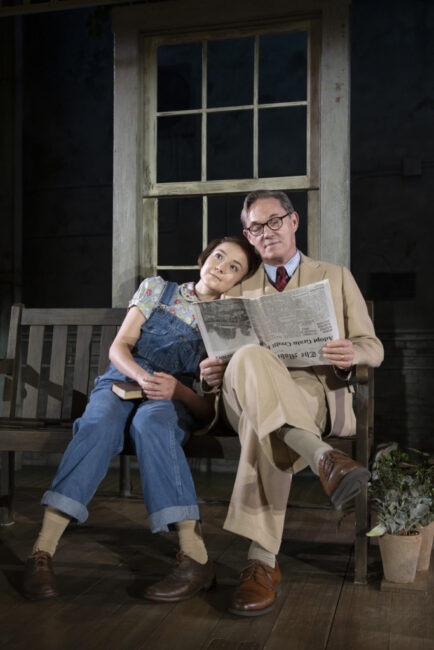
When you spend most of the show being aloof, level-headed, and cooler than a glass of sweet lemonade in the shade, one might find it jarring to see that same gathered and collected character lose his temper full-blast in the courtroom. Richard Thomas’ Atticus Finch does exactly that. There is this reverence about Thomas’ Atticus that just glides from scene to scene. Even when Jem refers to him as meek, you never get the sense that he’s anything of the sort. There is an unrufflable quality to the way Thomas presents this ‘simple southern lawyer who gets paid in vegetables.’ His accent fits perfectly into the setting of the play and his temperament is flawless, even when he busts out into peaks of enraged fury during certain scenes inside the courtroom. Watching Thomas sit unperturbed outside of the county jail in a high-stakes, heightened moment of extreme tension is truly a thing of beauty and ultimately his performance overall in this iconic literary character is superb.
A stellar dramatization, this poignant (and tragically still-relevant) piece of drama is truly a masterpiece of theatre for its time. If they didn’t announce at the top of the show that it’s 1934, you could easily mistake the play for something modern in some backwoods corner of present-day America.
Running Time: 2 hours and 55 minutes with one intermission
To Kill A Mockingbird plays through August 27th 2023 in the Eisenhower Theatre at The John F. Kennedy Center for the Performing Arts, 2700 F Street NW, Washington, DC. For tickets call the box office at (202) 467-4600 or purchase them online.
